|
|
|
Sort Order |
|
|
|
Items / Page
|
|
|
|
|
|
|
| Srl | Item |
| 1 |
ID:
171022
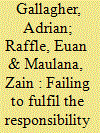

|
|
|
|
|
| Summary/Abstract |
The article provides the first substantive analysis of the war on drugs in the Philippines under the Responsibility to Protect. It develops in two stages. First, it argues that the war on drugs constitutes crimes against humanity through an analysis of, (i) extrajudicial killings and vigilante justice, (ii), dehumanisation, and, (iii) the exaggeration of threat. Second, it examines the response of the permanent five members of the UN Security Council (p5) and the Association of Southeast Asian Nations (ASEAN). Despite that the US, the UK, and France have expressed public concerns, we show that they prioritise counter-terrorism and trade over the Responsibility to Protect. Meanwhile, China and Russia uphold the view that the war on drugs is a matter of domestic jurisdiction. Regarding ASEAN, we draw on 26 semi-structured elite interviews conducted in South East Asia (2016-2018) to evidence that the elites prioritise state sovereignty and non-interference. The outcome is that there is a significant protection deficit as the government of the Philippines, the p5, and ASEAN are failing to protect those targeted in the war on drugs. We hope that the article will act as a catalyst for a much needed conversation on the international community’s political, legal, and moral responsibilities regarding mass violence against drug users in international relations.
|
|
|
|
|
|
|
|
|
|
|
|
|
|
|
|
| 2 |
ID:
075092
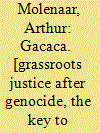

|
|
|
|
|
| Publication |
Leiden, African Studies Centre, 2005.
|
| Description |
x, 170p.
|
| Series |
African Studies Centre Research Report 77/2005
|
| Standard Number |
9054480564
|
|
|
|
|
|
|
|
|
|
|
|
Copies: C:1/I:0,R:0,Q:0
Circulation
| Accession# | Call# | Current Location | Status | Policy | Location |
| 051939 | 345.675110251/MOL 051939 | Main | On Shelf | General | |
|
|
|
|
| 3 |
ID:
096185
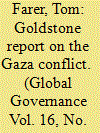

|
|
|
|
|
| Publication |
2010.
|
| Summary/Abstract |
By concluding that, in its assault on Gaza under the rubric of self-defense, Israel had targeted the civilian infrastructure and consciously "punished" the civilian population and demonstrated indifference to the suffering of noncombatants and engaged in other acts in violation of the laws of war, behaviors that possibly constituted in their totality crimes against humanity, the Goldstone Report became almost as controversial as the events precipitating it. In this agora, four eminent international lawyers, a mix of scholars and practitioners, assess from their distinctive perspectives the report's methodology, its compliance with fact-finding norms, and the overall quality of its effort to apply norms of international law to a bloody event in the ongoing multidecade conflict between Jews and Arabs over the governance and division of the former British-controlled Palestinian Mandate. Dialectically, they help to structure future debates over UN-sponsored fact-finding and also the normative parameters of the use of force by powerful states engaged in asymmetrical conflicts.
|
|
|
|
|
|
|
|
|
|
|
|
|
|
|
|
| 4 |
ID:
170258
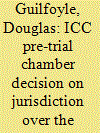

|
|
|
|
|
| Summary/Abstract |
The transfer and deportation of ethnically Rohingya people from Myanmar into Bangladesh is a crime against humanity demanding an international response. What role, however, should the International Criminal Court (ICC) play? On 6 September 2018 an ICC Pre-Trial Chamber ruled that the Court has jurisdiction to investigate and prosecute such crimes as they are completed on the territory of a State party, Bangladesh. Myanmar is not a party to ICC Statute and has invoked the principle that treaties do not bind third parties without their consent. The case put in this commentary is that while the Pre-Trial Chamber’s approach to the law was arguable as an interpretation of the ICC Statute, it was unwise as a matter of policy. The argument is threefold. First, the Pre-Trial Chamber’s ruling is as a matter of legal method only the first-move in a process of norm-creation and persuasion. Second, it does not follow that because territorial jurisdiction in international law includes ‘objective’ jurisdiction over transboundary acts completed on a State’s territory that such jurisdiction was delegated by member States to the ICC in all cases. Finally, it is argued that international criminal tribunals do not succeed when the cooperation of necessary territorial governments (here, Myanmar) is withheld. Proceeding in this case risks becoming a quagmire of the ICC’s own creation at a time when it can little afford further risks to its legitimacy.
|
|
|
|
|
|
|
|
|
|
|
|
|
|
|
|
| 5 |
ID:
075603
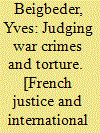

|
|
|
|
|
| Publication |
Leiden, Martinus Nijhoff Publishers, 2006.
|
| Description |
xxii, 377p.
|
| Standard Number |
9004153292
|
|
|
|
|
|
|
|
|
|
|
|
Copies: C:1/I:0,R:0,Q:0
Circulation
| Accession# | Call# | Current Location | Status | Policy | Location |
| 052101 | 341.69/BEI 052101 | Main | On Shelf | General | |
|
|
|
|
| 6 |
ID:
181033


|
|
|
|
|
| Summary/Abstract |
This article examines the international context of and empirical evidence for the genocide of Cambodia’s domestic ethnic Vietnamese minority in the years 1977 and 1978. It sets out the basis for the scholarly consensus that the state of Democratic Kampuchea (DK), ruled by the Communist Party of Kampuchea (CPK, or “Khmer Rouge”), launched a war against neighboring Vietnam beginning in early 1977 with a series of cross-border attacks. The article then examines the evidence for the simultaneous CPK campaign of near-total mass murder of the approximately 20,000 members of the domestic ethnic Vietnamese community remaining in the country after the killings and forcible expulsions under both the previous regime and the CPK from 1970 to 1976. The article then surveys the CPK’s ethnic policies towards the country’s Vietnamese, Cham, and Chinese minorities, and demonstrates how racist policies often merely masqueraded as class analysis. It concludes with a description of the international legal concepts of both genocide and the crime against humanity of extermination, showing how each applies to crimes the DK regime perpetrated against Cambodia’s ethnic Vietnamese minority.
|
|
|
|
|
|
|
|
|
|
|
|
|
|
|
|
| 7 |
ID:
159812
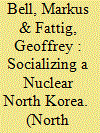

|
|
|
| 8 |
ID:
046112
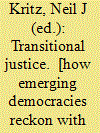

|
|
|
|
|
| Publication |
Washington, D. C., United States Institute of Peace, 1995.
|
| Description |
3v.(xl, 780p; xxxii, 834p.)
|
| Contents |
V.3.Laws, rulings, and reports
|
| Standard Number |
18789379453
|
|
|
|
|
|
|
|
|
|
|
|
Copies: C:2/I:0,R:0,Q:0
Circulation
| Accession# | Call# | Current Location | Status | Policy | Location |
| 046707 | 345.0231/KRI 046707 | Main | On Shelf | General | |
| 046708 | 345.0231/KRI 046708 | Main | On Shelf | General | |
|
|
|
|
| 9 |
ID:
120778
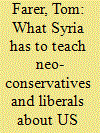

|
|
|
|
|
| Publication |
2013.
|
| Summary/Abstract |
The only means available to the US to assume a responsibility to protect the Syrian people from slaughter was by credibly threatening Bashar al-Assad and the security and military elite surrounding him with a decapitating air strike if they did not immediately cease murdering protestors and begin negotiations with opposition figures to the end of making the regime broadly representative of the Syrian population. Credibility probably demanded an initial decimation, a technically possible move. In part because the US lacks the ideology and institutional structure of a real imperial power, in part because it is post-Bush a careful calculator of national interests, Syria, unlike Libya but much like Sudan and the DRC, was a bridge too far.
|
|
|
|
|
|
|
|
|
|
|
|
|
|
|
|
| 10 |
ID:
155789
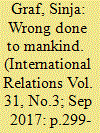

|
|
|
|
|
| Summary/Abstract |
Current debates on ‘crimes against humanity’ address its history and its potentially neo-imperial effects in international relations. In reference to these issues, this essay abstracts the idea of universal crime from the contemporary concept of ‘crimes against humanity’ and analyzes its mobilizations in early-modern perspectives on the legitimacy of European colonialism. First theorizing the easy union between notions of universal crime and arguments about European imperialism, I then draw on arguments by Vitoria, Gentili, and Grotius. I find that they rely on the idea of an offense injuring all mankind to negotiate colonial relationships between European powers and peoples abroad as well as between European powers vis-à-vis one another, both within Europe and in non-European spaces. The essay concludes by offering three venues for inquiry into the concepts of universal crime and crimes against humanity, namely their political productivity, their historical circulation, and their contemporary neo-imperial character.
|
|
|
|
|
|
|
|
|
|
|
|
|
|
|
|
|
|
|
|
|